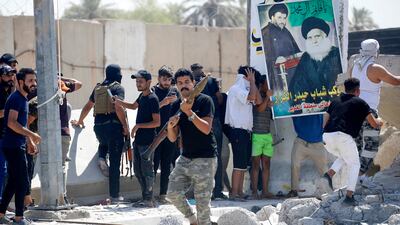“The very survival of the state is at stake.” That is the warning the UN issued about developments in Iraq on Monday, and it is not wrong. As the walls of the government compound are breached and curfew orders ignored, the Iraqi state is further undermined and its survival under threat.
Iraq has entered a new phase of violence that further chips away at the foundations of the state. And yet, this is not an armed revolt or a popular uprising against the government or its institutions. It is an armed confrontation between opposing political sides over who dominates Iraq. The groups fighting one another are at once involved in the running of the country and undermining the ruling order. That contradiction is the real threat facing the Iraqi state.
As members of armed groups attacked one another, members of Iraq’s army and police were primarily on the sidelines. Their task, for now, is to protect government buildings and residential areas but they have not actively sought to stop confrontations on the ground. Overnight, six members of the security forces were killed, while at least 15 others from the armed groups lost their lives. Iraqi Prime Minister Mustafa Al Kadhimi is facing a major dilemma: does he order the police and army to use force to implement his curfew and halt the attacks, risking an escalation that could lead to civil war, or does he tolerate the complete disregard for the law by armed groups? The latter option seems to be his current course of action but if the violence continues, he will have to reverse course. Taking a more robust approach would mean higher casualty count but that would also give more confidence in the government’s ability to carry out the most basic of its duties in maintaining law and order.
While the images of clashes in Baghdad and the sound of gunfire throughout the capital on Monday night were shocking, they were not surprising. A political impasse between armed groups would ultimately escalate to the use of force. After months of tensions and threats, the outbreak of clashes between supporters of Iraqi Shiite cleric Moqtada Al Sadr and members of militias reporting to the Co-ordination Framework (the grouping of Iranian-backed political parties) seemed inevitable. Tens of thousands of armed men have been given a signal that they can go on attack – and that is what they are doing. The escalation has included attacks on party headquarters in a number of provinces, including the offices of the Popular Mobilisation Unit’s media office in Baghdad and Saraya Al Salam offices (Mr Al Sadr’s armed group) in Basra. This is an armed confrontation between Shiite Islamist groupings. There are no undertones of sectarian and ethnic divisions, as witnessed in previous violent episodes.
The complexity of the developments in Baghdad require an understanding of the dynamics at play. Nearly 11 months after an election that illustrated the regression of Iranian-backed political groups, and the continued rise of Mr Al Sadr, Shiite Islamist parties are at loggerheads over who leads the country. Mr Al Sadr, securing 73 seats out of 329 in parliament, should have been able to form a government with his allies. However, the Federal Court decided that a two-thirds majority would be needed to name the president in order to form the government. This was a change intended to scupper government formation, with push from Iran and its main political operative in Iraq, former prime minister Nouri Al Maliki.
Unable to form a government, Mr Al Sadr has been warning that he will not be ignored for months, and incrementally built up to the moment of declaring his “retirement” from political life Monday morning. With that, he signalled that a political solution was not possible, moving to the street to force a solution. The day before, Ayatollah Kathem Al Haeri announced that he, too, would resign from public life and called on his followers to adhere to Iran’s supreme leader, Ayatollah Ali Khamenei, instead. But this is a problem for Mr Al Sadr, who has followed Al Haeri since the passing of his father and has been vehemently opposed to following Khamenei. With Al Haeri’s move, which many speculate came as a result of Iranian pressure, Mr Al Sadr is left in a precarious position – either follow Al Haeri’s directive or remain without a clear religious authority to follow. His decision is still unclear, but his “withdrawal from politics” is a further indication of the pressure he is under.
For most Iraqis, these are not battles they want to be involved in. The vast majority, the silent majority, are abiding by the curfew, sitting at home, doors closed and praying that the fighting does not reach their street. This is, sadly, a feeling and prayer that has been repeated all too many times over decades in Iraq. Waiting for this storm to pass, with minimal casualties is the best most hope for. Mr Al Sadr’s protests against corruption, a lack of respect for the law, and Iranian interference are generally supported by Iraqis, but a complete overhaul of the system would be needed to really tackle these ills.
The coming days will test Iraq’s ability to once again pull back from the brink of all-out war. The immediate concern and need will be to stop the violence. A de-escalation would be vital to avoid protracted street fights. However, that alone will not solve Iraq’s compounded problems. A long-term solution needs a reform of the political system, disarming militias and curbing the corruption that fuels their existence. A serious attempt to disarm the groups that took to the streets on Monday will be difficult, but the events of the last day could be a catalyst towards that end. For that, Mr Al Kadhimi and Iraq’s armed forces need all the support they can get, domestically and internationally.
































